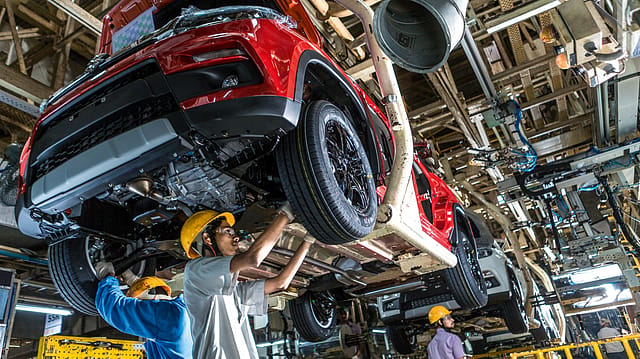ACMA watchful of recession fears in Europe; Covid lessons handy if cases spike
ADVERTISEMENT

The automotive component industry in India is readying to combat any spike in Covid-19 cases amidst rising concerns of yet another wave in India. China, U.S., Japan, and South Korea reported a massive spike in cases—should the virus resurge in the imminent future, says Sunjay Kapur, president, the Automotive Component Manufacturers Association of India (ACMA), highlighting the component industry's performance in the first half of this fiscal. Kapur says that while the pandemic and the consequent lockdowns were harsh on the industry, where there were months of zero revenue, no company in the industry went bankrupt or closed down, and neither there was any loss of life. This gives the industry the confidence that it is better prepared.
ACMA continues to be optimistic about the near-term future of the industry, watchful as fears of recession loom large predominantly in Europe, and in the U.S. "We need to be wary of the impending recession in Europe and the U.S. as also the supply chain issues which are not fully behind us," says Kapur. According to him, the demand for components in Europe is seeing a slowdown as a result of a prolonged armed conflict between Russia and Ukraine, and its effect on the supply chain, whereas the U.S. is also seeing softening of demand, as it is expected to enter "some sort of a recession", according to Kapur.
However, in the near term, he says that there is enough precedent for a favourable outlook for the industry. "I am optimistic that the current fiscal year will witness another good performance from the auto components sector. Further, with the growth in consumption of EVs, we are witnessing a fast transformation of the auto components sector to be an integral part of the EV manufacturing supply chain. The components industry is making steady investments and also acquiring technology companies," he explains. Mehta further adds that EVs currently make 1% of the revenue pie of the entire component industry, but in the near future, with increased adoption of EVs, the industry will see more contribution from EVs. "Majority of the new investments will go in EV. The capex investment will also go into EVs,” says Kapur.
According to ACMA, the automotive component industry has grown 34.8% to ₹2.65 lakh crore in the first half of 2022-23 over last year. Exports of auto components grew by 8.6% to ₹79,033 crore in the same period, whereas imports grew by 17.2% to ₹79,815 crore. While the industry reported a trade surplus of $700 million at the end of the last fiscal, the industry reported a trade deficit in the first six months of this fiscal. Asian and European imports account for over 90% of all imports—both having outperformed the global average. Exports to the Commonwealth of Independent States (CIS)—which consist of eleven countries from the erstwhile Soviet Union—and the Baltic region fell sharply by 66% due to the war in Ukraine and the sanctions imposed on Russia.
Mehta attributes this to the ongoing Russia-Ukraine war that caused a huge spike in global oil and commodity prices, depreciation of the rupee, supply chain bottlenecks due to the slow easing of Covid-19-related restrictions in China, and pent-up demand for imports (especially of semiconductor chips) as the manufacturing sector recovered from the pandemic's shadow. Kapur says that while the industry is coming out of the shadows of the pandemic-induced disruptions in supply chain, it is not totally out of the woods of the said disruption, and the industry is yet to return to a just-in-time inventory system, instead of stocking up on raw material to avert the impact of any disruption in the supply chain. "The just-in-time inventory system is the more efficient system, and the end goal is to go back to things the way they were."